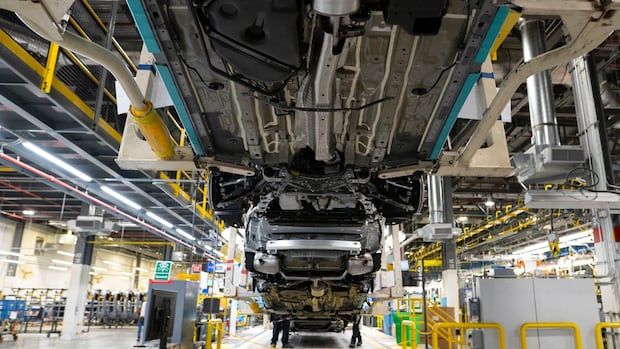A Japanese news outlet is reporting that Honda is considering moving some of its production out of Canada amid the ongoing tariff threats from U.S. President Donald Trump — though automotive experts in Ontario said early Tuesday this may be contingency planning.
Honda is considering switching some car production from Mexico and Canada to the United States, aiming for 90 per cent of cars sold in the country to be made locally in response to new U.S. auto tariffs, the Nikkei newspaper reported on Tuesday.
Such a move would be a major blow to Ontario, which has a large Honda plant in Alliston that was in line to see a massive expansion.
CBC News has reached out to Honda for comment.
Two sources close to the federal government told Radio-Canada this would be a hard blow for the Canadian auto industry.
Dominic LeBlanc, the federal Minister of International Trade and Intergovernmental Affairs, discussed the situation with Ontario Premier Doug Ford yesterday, the sources confirmed.
One government source, who said they have spoken to contacts in Japan, said the $15 billion agreement signed by Honda, Ontario and Canada last year to create a comprehensive electric vehicle supply chain still stands.
Flavio Volpe, president of the Automotive Parts Manufacturers’ Association, said there’s reason to question the Nikkei report.
“The Honda news appears to be based on a Nikkei report on two and three-year contingency planning. The Japanese plan for plans,” he told CBC News Network.
“I don’t see Honda in Ontario being affected at the moment.”
All automakers likely considering similar plans: expert
The report shows the “total chaos” for auto companies right now as they attempt to plan around Trump’s rapidly changing tariff announcements, said Greg Layson, digital and online editor for Automotive News Canada.
Automakers are likely planning for the worst-case scenario should the tariffs become permanent, he said.
“While this [plan] is one that has leaked, I would assume that there are other high level managers at all automakers operating in Ontario considering the exact same thing,” Layson said in an interview with CBC’s Metro Morning on Tuesday.
Though there’s a risk of auto companies reducing production in Canada and increasing existing production in the U.S., Layson said such moves could take between two to three years, and cost between $2 and $5 billion.
“They have to find the land, the supply chain and … essentially relocate an entire factory,” he said. “That is not easy and it doesn’t happen fast.”
More to come.
